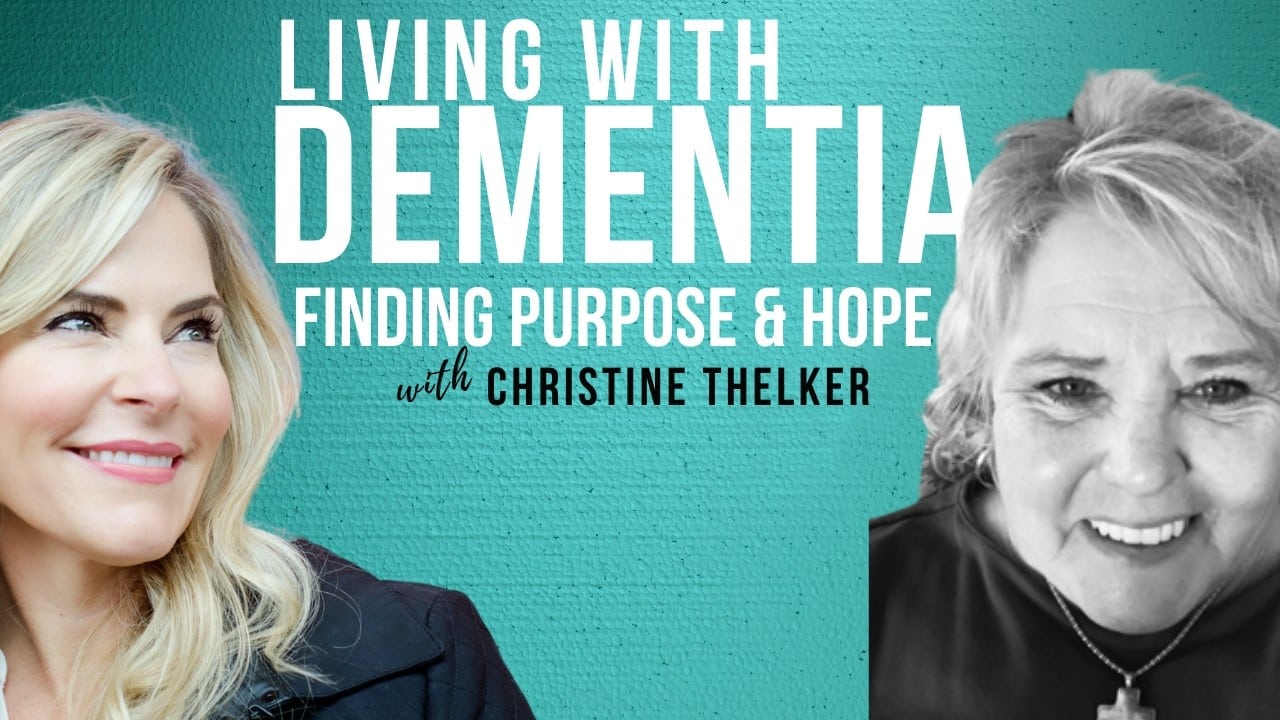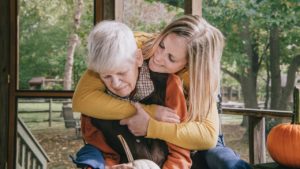Chrissy Thelker was 55 years old when she had her first stroke and was subsequently diagnosed with Vascular Dementia.
With more and more people living with dementia, it’s imperative that we gain perspective and understanding of the lived experience of people living with dementia and the importance of advocacy, peer support, and building a purpose-filled life living with dementia.
Today’s guest shows us how.
Here’s a sneak peek at what you’ll learn from my interview with Chrissy Thelker:
- [07:21] Chrissy shares the painful experience of losing her husband to cancer when she was 47 years old, and just 2 weeks after he was diagnosed.
- [12:38] Chrissy recalls the moment she had a stroke at work and describes feeling her body “sliding down the wall”– it was after this that she was diagnosed with Vascular Dementia at the age of 55.
- [21:26] A lot has changed since Chrissy had been diagnosed and living with dementia. She describes a combination of freedom and of loss. And, there has been a toll on her relationships.
- [26:05] Dementia Alliance International (DAI) is an organization run by people living with dementia in 49 countries. Chrissy says DAI provided a sense of belonging and explained that it changed her life. Learn more here.
- [30:38] When Chrissy was diagnosed with dementia, she was given the message to “get your affairs in order” but was not offered much support beyond that. Chrissy reveals what it was like to be given the diagnosis of dementia and the hopelessness and loneliness that she felt afterward.
- [35:55] A purpose-filled life is Chrissy’s focus now. Learn where Chrissy finds meaning and hope.
- [46:40] Chrissy shares her recommendations for people newly diagnosed with dementia
- [51:49] Chrissy shares her recommendations for family members caring for a person with dementia. Here’s a hint: “Don’t disable, enable.”
In this clip, Chrissy shares how life is different since being diagnosed with dementia and talks about the organization that she says, “saved my life”.
About Chrissy Thelker
Christine Thelker from Vernon British Columbia Canada. describers herself as bright, fun and adventurous. Who at 61says, her sense of humor has grown, since her diagnosis. Widowed at 47 and then diagnosed with Vascular Dementia and Cerebrovascular Disease at 56.
Christine worked for Interior Health Authority for 13 years in various sites, Most loved work was in Dementia Care and End of Life Care. It was here that she felt she did her best work.
Advocating for families and Patients, advocating for better training for workers working in Dementia Care, and although she says things still have not changed, she is hopeful with more people using their voices the changes will happen. She knows first hand how peoples abilities are stripped instead of embraced and advocating is the only way to make change happen. She also advocated for better working environments for the workers.
Christine Designed and taught a program to nursing students at the local Colleges on end of life care and dementia care, and designed program on Unattended Sorrow, which was in relation to all the deaths workers saw and the cumulative effects, Christine believes it has many similar effects on people diagnosed with Dementia, and would like to do more work around that. Christine currently writes a blog “ Chrissy’s Journey, Walking the Nueron Forest.. called Dementia”. A lack of resources and support sent Christine in search of help and in her search found Dementia Alliance International, it was life changing and life saving for her
Christine is still advocating, using her voice to try to help others. She looks for places and venues to do public speaking about living with Dementia to try to end the stigma around the illness. In July 2018 presented at the Alzheimer’s Disease International Conference in Chicago. IN June of 0f 2019 she spoke at the Convention of State Parties on the Rights of Persons with Disabilities at the United Nations in New York. Christine loves working with the Dementia Alliance International, and believes whole heartedly that is what helps keep her living well with her Dementia., she also continues to work with a variety of Research groups, both Nationally and Globally.
Christine believes that having being diagnosed with Dementia has given her the ability to truly enjoy and appreciate life in the simplest form, and dislikes hearing that people with dementia are suffering, when in fact many are living well with Dementia.
Her Motto since being diagnosed is “I’m not done yet&rdquo
Connect with Chrissy Thelker</strong





